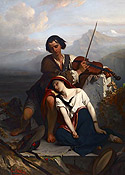Notes on the Melody of Things (Notizen zur Melodie der Dinge)
, translated by Kline, A. S. (contact-email)
Rilke’s ‘Notes on the Melody of Things’ derives from his relationship with Lou Andreas-Salomé, the Russian-born psychoanalyst, well-travelled author, narrator, and essayist, who was a friend of Freud and Friedrich Nietzsche and who introduced Rilke to the latter’s philosophy (Rilke and she first met in the summer of 1897), and also, his visits to Venice in early 1897, and Florence in 1898, where he saw and studied examples of Italian Renaissance painting. His experiences of live theatre further inform the work.
Among their themes, Rilke’s ‘Notes’, explore the issue of our relationship to the natural world, and to each other, and the aims, achievements, and shortcomings of artistic endeavour, especially as regards theatre and the visual arts. The stage, in particular, signifies here the world of human activity in which our drama is played out, consciously or unconsciously, against the natural and universal backcloth. The ‘melody of things’, he claims, is that background to human existence, that melody, which we must understand in order to fully comprehend life.

Kline, A. S.
Support Open-Access:
Your contribution keeps our classical translations available to all. Every dollar helps support classics education and funds the expansion of our catalogue. Value what we do? Donate now.
File Downloads:
© Copyright, All Rights Reserved. This work may be freely reproduced, stored and transmitted, electronically or otherwise, for any non-commercial purpose. Conditions and Exceptions apply.